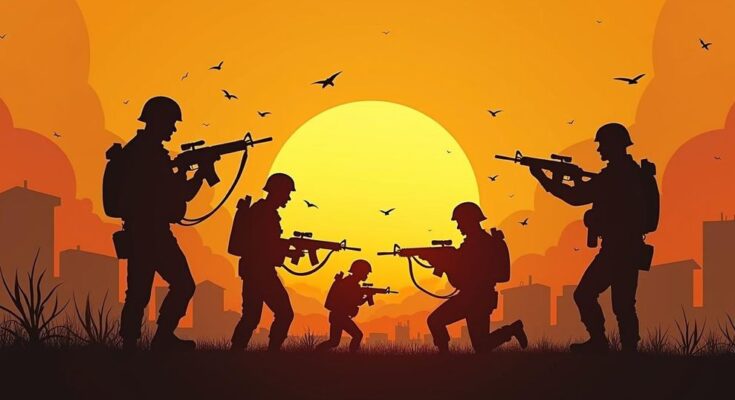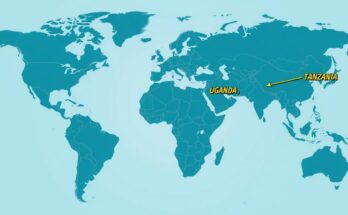Hezbollah is actively engaging Israeli forces in Lebanon as Israel intensifies its military operations in Gaza, leading to casualties and humanitarian distress. Global reactions involve strong support for Israel, calls for US military responses against Iran, and reports of canceled flights in the region amid escalating tensions. The humanitarian crisis in Lebanon is significant, with displaced families struggling to meet basic needs.
Hezbollah engaged in combat with Israeli forces in southern Lebanon, coinciding with heightened Israeli airstrikes in Gaza. Reports indicate that Israeli helicopters were dispatched to evacuate wounded troops following a Hezbollah offensive. Concurrently, the Wafa news agency disclosed an Israeli airstrike on the residence of journalist Ahmed al-Zard in southern Gaza, resulting in fatalities among his family members, including his brother, uncle, and two cousins. Al-Zard sustained severe injuries and, along with his mother and another brother, is currently hospitalized. Emergency responders faced challenges as Israeli forces restricted access to the area, effectively preventing ambulances from reaching injured individuals trapped under the debris. In the United States, Republican leaders have voiced support for potential military action against Iran in light of missile launches that targeted Israel. Amid these developments, the Emirati airline FlyDubai announced the cancellation of flights to various Middle Eastern destinations due to escalating regional tensions and temporary airspace closures. The Jordanian government reported minor injuries related to the conflict and affirmed its commitment to maintaining national security without becoming a battlefield. Australian Prime Minister Anthony Albanese condemned Iran’s missile attacks as a “dangerous escalation,” urging for de-escalation to protect civilian lives. Statements from both Republican Vice Presidential candidates established a firm commitment to support Israel, expressing that US backing is essential for Israeli security. This environment of escalating tensions has seen significant involvement from the Biden administration, with various government departments engaged in extensive coordination with Israeli officials during ongoing military operations. Furthermore, Japan’s Prime Minister Shigeru Ishiba expressed condemnation of Iran’s actions, advocating for cooperative efforts with the United States to prevent further escalation. Negar Mortazavi, a senior fellow at the Center for International Policy, articulated that Iran perceives its missile attacks as necessary responses to Israeli aggression and a warning to prevent ongoing escalation. The International Rescue Committee (IRC) highlighted the humanitarian crisis faced by Lebanese families displaced from recent hostilities, reporting that a considerable majority lack access to essential resources such as food and healthcare. The dire circumstances have been particularly severe for children and Syrian refugees, compounding the region’s overall humanitarian challenges.
The article centers around the escalating conflict between Hezbollah and Israel, marked by direct military engagements in Lebanon and intensified Israeli airstrikes in Gaza. The conflict has drawn international attention, especially regarding responses from various nations including the United States, Australia, and Japan. The implications of these actions raise concerns about regional stability and humanitarian conditions for those affected by the ongoing violence. The issuance of retaliatory military strategies and diplomatic reactions reflect broader geopolitical dynamics that necessitate careful scrutiny.
In conclusion, the unfolding situation reflects a complex interplay of military actions, international diplomatic responses, and severe humanitarian crises arising from the conflict between Israel and Hezbollah, compounded by Iranian missile strikes. The responses from key international leaders underscore the urgency of addressing both security issues and humanitarian needs to prevent further escalation in the already volatile region.
Original Source: www.aljazeera.com




